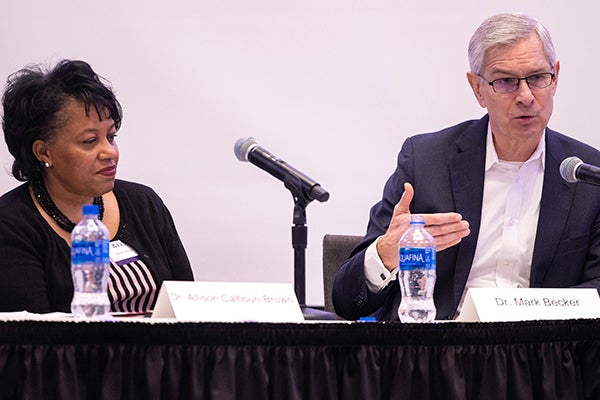Higher education leaders discuss student access, success
East Carolina University’s Commission on Diversity, Equity and Inclusion (DEI) hosted a conversation with Georgia State University’s (GSU) executive in residence and former GSU president Dr. Mark Becker and current Senior Vice President of Student Success Dr. Allison Calhoun-Brown on April 1.
GSU is home to the National Institute for Student Success and has earned a reputation as a national leader in student access and success. Initiatives the university implemented closed achievement gaps based on race, ethnicity and income at Georgia State, a public research university in Atlanta with more than 51,000 students.

Dr. Allison Calhoun-Brown, left, and Dr. Mark Becker of Georgia State University respond to questions during their visit at ECU. (Photo by Rhett Butler)
Dr. Allison Danell, dean of ECU’s Thomas Harriot College of Arts and Sciences and co-chair of the DEI commission opened the discussion with an overview of the commission’s goals and purpose for inviting Becker and Calhoun-Brown. She said ECU’s graduation and retention rates are something the university should be proud of and has worked hard to achieve. However, achievement gaps exist at ECU like most campuses across the country. One of the commission’s goals is to improve outcomes for all students.
GSU was ranked the second most innovative university in the country and second for best undergraduate teaching by U.S. News and World Report in 2022.
“Georgia State’s really been able to close those achievement gaps socioeconomically, racially, so they can move forward and achieve equitable outcomes across all of their student populations,” ECU Chancellor Philip Rogers said.
Moderated by Rogers, the event focused on GSU’s journey using predictive analytics along with academic and financial support to help close achievement gaps and increase graduation rates by 23 points in the past decade. ECU leadership, faculty and staff attended and participated in a question-and-answer session about GSU’s successful model for student success.
Becker stressed that improving student success is a lifetime commitment and one that includes the entire campus community working together for a common goal.
“One of the things that Georgia State had was a commitment to student success. The people that were there loved the students, believed in higher education and wanted to make a difference,” Calhoun-Brown said.
Like most universities, she said GSU had data it could use to its advantage to determine warning signs in students related to academic performance. Calhoun-Brown said the first noticeable change took place within academic advising.
GSU used data to determine the most common reasons students got off track, and advisors acted by reaching out to the student with helpful information. Last year, GSU had about 100,000 meetings between advisors and students based on markers that could predict future student success. They also used data to identify how the university had created barriers to success and access and whether there were ways to remove some of those obstacles.
“We expect students to come to college ready, but we weren’t doing a lot to be student ready,” said Calhoun-Brown.
GSU also found ways to overcome minor financial obstacles that would often keep students from continuing their education. Staff and faculty began contacting students who were not returning to GSU to find out why. Many found that some of those obstacles were financial responsibilities of a few hundred dollars. A special fund at GSU is used to help students on a selective basis when a debt is the reason a student can’t return.
ECU’s DEI commission subcommittee on student access and success is considering key research, data and information and will engage the campus community to facilitate discussion. It will develop recommendations and help establish priorities that will eliminate inequities and contribute to a more equitable, inclusive and diverse environment at ECU.
“When I think of all that we’ve done at ECU to try and address student access and success I think we have a really impressive inventory of major student success initiatives… What the DEI commission, in my opinion, is looking to do, is expand and leverage what we already do so well,” Danell said.